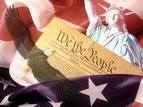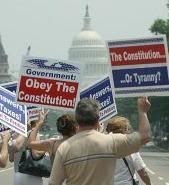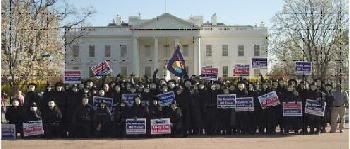Liberty or Liberties…YOUR Choice

Thursday, February 22
Which do YOU choose? You cannot claim both.
A man who freely chooses to declare himself a “citizen” owes fealty to an earthly Master, from whom he is granted certain Liberties at the Master’s will.
A man who freely chooses to claim his birthright enjoys his Liberty from any and all earthly Masters because he is an Individual Political Sovereign and therefore master over himself.
A citizen solemnly pledges allegiance to his earthly Master.
An Individual Political Sovereign solemnly pledges allegiance to his Creator, and is therefore bound into pledging loving brotherhood to all mankind.
A citizen must challenge his earthly Master to allow him to claim his “right” to petition for redress of grievances.
An Individual Political Sovereign petitions no one except his peers to secure the justice that he is due. Click here to read more.
Listen to our interview with "We The People Have The Power" founder, Cheryl Lynch:
11:39 minutes into the interview:
Fred: Who are [Ed and Elaine] dealing with?
Cheryl: If they are interacting with the court at all…they’re doing…
Fred: It’s a grant of jurisdiction.
Cheryl: It’s implied….But their behavior has been outside. So the court is confused. They’re between a rock and a hard place, too. They don’t want to admit that Ed doesn’t have to abide by this whole procedure because it would alert the whole country about their rights. We’re blowing the whole thing open right here in this moment.
powered by Audioblog.com
MP3 File












7 Comments:
Thanks Fred!
The U.S. Supreme Court disagrees, as evidenced (among many things) by the effect that it allows the convictions fo tax protestors to stand.
If the Justices of the U.S. Supreme Court heard this argument, they would bust out laughing just as the judges on every other court to hear this argument have (usually just before entering a fine for a "frivolous" argument, which is Latin for "stupid as a matter of law).
That is why tax protestors NEVER WIN in their attempts to avoid taxes. They may occasionally avoid conviction on a Cheek defense on the basis that they were too stooopid to understand their obligation to pay taxes, but no tax protestor has ever avoided the liability.
Various Court statements about TAXABLE INCOME:
Stapler v U.S., 21 F Supp 737 AT 739 (1937): "Income within the meaning of the Sixteenth Amendment and the Revenue Act, means 'gain'... and in such connection 'Gain' means profit...proceeding from property, severed from capital, however invested or employed, and coming in, received, or drawn by the taxpayer, for his separate use, benefit and disposal... Income is not a wage or compensation for any type of labor."
Oliver v. Halstead 86 S.E. Rep 2nd 859 (1955): "There is a clear distinction between `profit' and `wages', or a compensation for labor. Compensation for labor (wages) cannot be regarded as profit within the meaning of the law. The word `profit', as ordinarily used, means the gain made upon any business or investment -- a different thing altogether from the mere compensation for labor."
Helvering v Edison Bros. Stores, 133 F2d 575 (1943): "The Treasury cannot by interpretive regulations, make income of that which is not income within the meaning of the revenue acts of Congress, nor can Congress, without apportionment, tax as income that which is not income within the meaning of the 16th Amendment."
Flora v U.S., 362 U.S. 145, (1959) never overruled: "... the government can collect the tax from a district court suitor by exercising it's power of distraint... but we cannot believe that compelling resort to this extraordinary procedure is either wise or in accord with congressional intent. Our system of taxation is based upon VOLUNTARY ASSESSMENT AND PAYMENT , NOT UPON DISTRAINT" [Footnote 43] If the government is forced to use these remedies(distraint) on a large scale, it will affect adversely the taxpayers willingness to perform under our VOLUNTARY assessment system.
Evens v Gore, 253 U.S. 245 (1920): US Supreme court, never overruled "After further consideration, we adhere to that view and accordingly hold that the Sixteenth Amendment does not authorize or support the tax in question. " (A tax on salary)
Edwards v. Keith, 231 F 110,113 (1916): "The phraseology of form 1040 is somewhat obscure .... But it matters little what it does mean; the statute and the statute alone determines what is income to be taxed. It taxes only income "derived" from many different sources; one does not "derive income" by rendering services and charging for them... IRS cannot enlarge the scope of the statute."
McCutchin v Commissioner of IRS, 159 F2d: "The 16th Amendment does not authorize laying of an income tax upon one person for the income derived solely from another."[wages]
Blatt Co. v U.S., 305 U.S. 267, 59 S.Ct. 186 (1938): "Treasury regulations can add nothing to income as defined by Congress."
Olk v. United States, February 18, 1975, Las Vegas, Nevada."Tips are gifts and therefore are not taxable."
Commissioner of IRS v Duberstein, 363 U.S. 278, 80 S. Ct. 1190 (1960):
"The exclusion of property acquired by gift from gross income under the federal income tax laws was made in the first income tax statute 4 passed under the authority of the Sixteenth Amendment, and has been a feature of the income tax statutes ever since. The meaning of the term "gift" as applied to particular transfers has always been a matter of contention. 5 Specific and illuminating legislative history on the point does not appear to exist. Analogies and inferences drawn from other revenue provisions, such as the estate and gift taxes, are dubious. See Lockard v. Commissioner, 166 F.2d 409. The meaning of the statutory term has been shaped largely by the decisional law."
Central Illinois Publishing Service v. U.S., 435 U.S. 21 (1978): "Decided cases have made the distinction between wages and income and have refused to equate the two."
Anderson Oldsmobile, Inc. vs Hofferbert, 102 F Supp 902: "Constitutionally the only thing that can be taxed by Congress is "income." And the tax actually imposed by Congress has been on net income as distinct from gross income. THE TAX IS NOT, NEVER HAS BEEN, AND COULD NOT CONSTITUTIONALLY BE UPON "GROSS RECEIPTS" ..."
Conner v US, 303 F Supp 1187 Federal District Court, Houston, never overruled. "..whatever may constitute income, therefore, must have the essential feature of gain to the recipient. This was true at the time of Eisner V Macomber, it was true under section 22(a) of the Internal Revenue Code of 1938, and it is likewise true under Section 61(a) of the IRS code of 1954. If there is not gain, there is not income, CONGRESS HAS TAXED INCOME, NOT COMPENSATION"!!!
Bowers vs Kerbaugh-Empire Co., 271 US 174 (1926): "Income" has been taken to mean the same thing as used in the Corporation Excise Tax Act of 1909, in the Sixteenth Amendment and in the various revenue acts subsequently passed ...."
Brushaber v. Union Pacific R.R. Co., 240 U.S. 1 (1916): "The conclusion reached in the Pollock Case did not in any degree involve holding that income taxes generically and necessarily came within the class of direct taxes on property, but on the contrary recognized the fact that taxation on income was in its nature an excise entitled to be enforced as such..."
Simms v. Ahrens, 271 SW 720 (1925): "An income tax is neither a property tax nor a tax on occupations of common right, but is an EXCISE tax...The legislature may declare as 'privileged' and tax as such for state revenue, those pursuits not matters of common right, but it has no power to declare as a 'privilege' and tax for revenue purposes, occupations that are of common right."
Eisner v. Macomber, 252 US 189 (1920), US Supreme court, never overruled: "...the definition of 'income' approved by this court is: The gain derived from capital, from labor, or from both combined, provided it be understood to include profits gained through sale or conversion of capital assets."
Laureldale Cemetery Assoc. v. Matthews, 345 Pa. 239 (1946): "Reasonable compensation for labor or services rendered is not profit"
Schuster v. Helvering, 121 F 2nd 643: "Income is realized gain."
Butchers' Union Co. v. Crescent City Co., 111 U.S. 746 (1883). One of the most eloquent opinions ever delivered by the Court..
"Among these unalienable rights, as proclaimed in the Declaration of Independence is the right of men to pursue their happiness, by which is meant, the right any lawful business or vocation, in any manner not inconsistent with the equal rights of others, which may increase their prosperity or develop their faculties, so as to give them their highest enjoyment...It has been well said that, THE PROPERTY WHICH EVERY MAN HAS IS HIS OWN LABOR, AS IT IS THE ORIGINAL FOUNDATION OF ALL OTHER PROPERTY SO IT IS THE MOST SACRED AND INVIOLABLE..."
Pollack v. Farmers Loan, 157 U.S. 429, 158 U.S. 601 (1895): The Corporate Excise Tax of 1909 was a 2% tax on PROFITS OF CORPORATIONS. The Supreme Court had, in POLLOCK v. FARMERS LOAN , in 1894, ruled as UNCONSTITUTIONAL the EXACT SAME KIND OF TAX MOST AMERICANS ARE NOW PAYING! [A direct tax without apportionment.] This decision has NEVER been overturned! Both BEFORE and AFTER the sixteenth amendment passed (?), THE COURTS SAID INCOME WAS CORPORATE PROFIT! The Separation of powers doctrine says only CONGRESS can collect a tax!
http://sedm.org/Forms/MemLaw/PoliticalJurisdiction.pdf
Two words often said by the U.S. Supreme Court in evaluating tax protestor claims: "Cert. Denied".
Just ask Phil Marsh, Lynne Meredith, Irwin Schiff, etc., etc., etc., etc., and soon including Ed and Elaine Brown.
JOEY is sounding just like the way judges act. It's the law but don't bring it up again.
There lies the problem HA!
Tell Em Thurston... Joey Too Often... Misses the Point.
Post a Comment
Subscribe to Post Comments [Atom]
<< Home